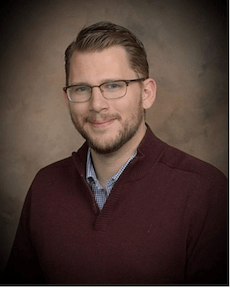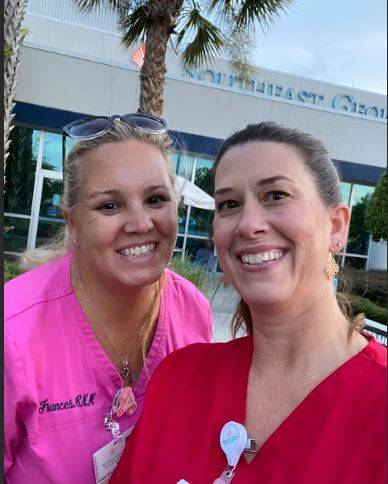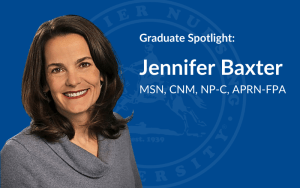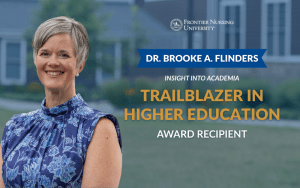Frontier Nursing University preceptors carry forward our mission and play a significant role in shaping the dedicated nurse-midwives and nurse practitioners of tomorrow. To celebrate their invaluable contributions, our students nominate a preceptor to be recognized as the “featured preceptor of the term”. Here are six exceptional preceptors we’ve featured over the past year.
Lance Briggs, PMHNP
 Lance Briggs has shown dedication in his work as a preceptor at FNU, consistently working to help students integrate their knowledge and build confidence in their practice. His commitment to providing a safe and supportive environment for budding mental health and psychiatric nurses is evident, displaying a passion for helping incoming psychiatric-mental health nurse practitioners (PMHNPs) shorten the gap between learning and feeling confident in their abilities.
Lance Briggs has shown dedication in his work as a preceptor at FNU, consistently working to help students integrate their knowledge and build confidence in their practice. His commitment to providing a safe and supportive environment for budding mental health and psychiatric nurses is evident, displaying a passion for helping incoming psychiatric-mental health nurse practitioners (PMHNPs) shorten the gap between learning and feeling confident in their abilities.
Taking on a light-hearted attitude in his approach to precepting, Briggs enjoys joking around with students, answering their questions and learning new things from them. By creating a relaxed and enjoyable learning environment, Briggs encourages students to engage more fully with the material and to be more confident in their ability to apply it in practice.
“Lance allows students to learn in the way that best fits their individual needs,” said FNU student Terra Edwards.
James Flint, PMHNP
 For James Flint, becoming an FNU preceptor was motivated by the challenges he faced during his own education. As a PMHNP student, Flint found securing a preceptor to be one of the most difficult aspects of his training. His desire to ease this burden for current students led him to take on the role, aiming to reduce the stress and frustration associated with finding preceptors.
For James Flint, becoming an FNU preceptor was motivated by the challenges he faced during his own education. As a PMHNP student, Flint found securing a preceptor to be one of the most difficult aspects of his training. His desire to ease this burden for current students led him to take on the role, aiming to reduce the stress and frustration associated with finding preceptors.
Balancing his precepting duties with his work as a PMHNP in Phoenix, Arizona, Flint has been with La Frontera Arizona, a nonprofit behavioral health center, for three years. There, he serves patients on state insurance, including children, adolescents, and adults with various psychiatric diagnoses. Flint’s dedication and supportive approach have made a significant impact on his students, like Alexandra Hauser, who praises his patience, thorough explanations, and commitment to sharing patient histories to ensure comprehensive learning experiences.
“He has allowed me to evaluate and treat every patient that has been willing with his validation and guidance,” said Hauser. “He has gone above and beyond to share patient histories with me so that I am prepared for the visit. My experience with Mr. Flint has been so valuable and I feel lucky to have had such a kind and encouraging mentor.”
Frances Sahrphillips, CNM and Tricia Heinrich, CNM

Frances Sahrphillips, CNM with student Karen Howell
FNU preceptors Frances Sahrphillips and Tricia Heinrich are dedicated to preparing the healthcare professionals of tomorrow while making a positive impact on patients’ lives today. As Certified Nurse-Midwives (CNMs) at Southeast Georgia Health System, they serve women from adolescence to menopause, including many active duty military members and dependents, as well as residents of surrounding rural counties where obstetrical services are unavailable. Sahrphillips also works with the Georgia Health Department Coastal Health District Camden County and is a published author and board member of the Georgia Perinatal Association.
Sahrphillips and Heinrich have jointly precepted numerous FNU students. This is particularly rewarding for Heinrich, who is an FNU alum. Karen Howell, the first DNP student Sahrphillips and Heinrich have precepted together, said they have done everything necessary to make sure she can succeed and have been encouraging in her professional growth.
“They are a dynamic duo who are always concerned with providing quality care with a patient-centered focus and in a timely manner in a collaborative practice,” she said.
Michelle Quale, FNP
 Despite her many responsibilities in addressing the healthcare needs of her local community, Michelle Quale dedicates time to passionately mentor the next generation of healthcare professionals through precepting. Based in Glencoe, Minnesota, Quale serves as a family nurse practitioner and certified nurse-midwife at Glencoe Regional Health, working with a rural population. Her diverse role includes family practice, the birth center, the wound center, urgent care, hospitalist duties, and providing healthcare services to the local jail.
Despite her many responsibilities in addressing the healthcare needs of her local community, Michelle Quale dedicates time to passionately mentor the next generation of healthcare professionals through precepting. Based in Glencoe, Minnesota, Quale serves as a family nurse practitioner and certified nurse-midwife at Glencoe Regional Health, working with a rural population. Her diverse role includes family practice, the birth center, the wound center, urgent care, hospitalist duties, and providing healthcare services to the local jail.
With several years of precepting experience, Quale has guided numerous FNU students. She views precepting as a journey of mutual learning, where the enthusiasm of students fuels her own passion for continuous growth. Colleague April Trebelhorn credits Quale with encouraging her to step out of her comfort zone and pursue essential steps for professional development.
“Michelle has been an amazing preceptor and role model for myself. She is compassionate, organized, has amazing attention to detail and is a down to earth provider that her patients trust and connect with,” she said.
Dr. Jennifer Carter, DNP, WHNP
 Dr. Jennifer Carter, who earned both her MSN and DNP from Frontier Nursing University, has over six years of experience as a preceptor. Driven by a commitment to educate future nurse practitioners while serving her patients and community, Dr. Carter finds precepting to be mutually beneficial, noting that it allows her to grow in my own practice and facilitates her own continuous learning.
Dr. Jennifer Carter, who earned both her MSN and DNP from Frontier Nursing University, has over six years of experience as a preceptor. Driven by a commitment to educate future nurse practitioners while serving her patients and community, Dr. Carter finds precepting to be mutually beneficial, noting that it allows her to grow in my own practice and facilitates her own continuous learning.
A resident of Greenville, Texas, Dr. Carter works as a Women’s Health Nurse Practitioner (WHNP) with Zapata Women’s Health, caring for women from all socioeconomic backgrounds in a predominantly rural area. Her practice covers a wide range of care, from educating young teens about birth control to managing ante and postpartum care, advising on hormone replacement therapy, and addressing gynecological issues in elderly patients. Mentoring multiple FNU students has highlighted her passion for teaching and building relationships.
“She encouraged me to be hands-on right away and her teaching style allowed me to increase my confidence as a future WHNP,” said Jessica VanScoyoc, a student of Dr. Carter’s.
We are so grateful for our preceptors who are not only an integral part of the educational experience for FNU students, but also for promoting the nursing profession. If you are interested in becoming a preceptor, fill out our inquiry form to get started!
Learn more about advanced nursing degrees and specialties at Frontier Nursing University. Subscribe to our blog for the latest news and events at FNU and to get inspired with stories featuring our alumni, students, faculty, preceptors and staff!






















 Carrie Belin is an experienced board-certified Family Nurse Practitioner and a graduate of the Johns Hopkins DNP program, Johns Hopkins Bloomberg School of Public Health, Georgetown University School of Nursing, and Johns Hopkins School of Nursing. She has also completed fellowships at Georgetown and the University of California Irvine.
Carrie Belin is an experienced board-certified Family Nurse Practitioner and a graduate of the Johns Hopkins DNP program, Johns Hopkins Bloomberg School of Public Health, Georgetown University School of Nursing, and Johns Hopkins School of Nursing. She has also completed fellowships at Georgetown and the University of California Irvine. Angie has been a full-scope midwife since 2009. She has experience in various birth settings including home, hospital, and birth centers. She is committed to integrating the midwifery model of care in the US. She completed her master’s degree in nurse-midwifery at Frontier Nursing University (FNU) and her Doctorate at Johns Hopkins University. She currently serves as the midwifery clinical faculty at FNU. Angie is motivated by the desire to improve the quality of healthcare and has led quality improvement projects on skin-to-skin implementation, labor induction, and improving transfer of care practices between hospital and community midwives. In 2017, she created a short film on skin-to-skin called
Angie has been a full-scope midwife since 2009. She has experience in various birth settings including home, hospital, and birth centers. She is committed to integrating the midwifery model of care in the US. She completed her master’s degree in nurse-midwifery at Frontier Nursing University (FNU) and her Doctorate at Johns Hopkins University. She currently serves as the midwifery clinical faculty at FNU. Angie is motivated by the desire to improve the quality of healthcare and has led quality improvement projects on skin-to-skin implementation, labor induction, and improving transfer of care practices between hospital and community midwives. In 2017, she created a short film on skin-to-skin called 










 Justin C. Daily, BSN, RN, has ten years of experience in nursing. At the start of his nursing career, Justin worked as a floor nurse on the oncology floor at St. Francis. He then spent two years as the Director of Nursing in a small rural Kansas hospital before returning to St. Francis and the oncology unit. He has been in his current position as the Chemo Nurse Educator for the past four years. He earned an Associate in Nurse from Hutchinson Community College and a Bachelor of Science in Nursing from Bethel College.
Justin C. Daily, BSN, RN, has ten years of experience in nursing. At the start of his nursing career, Justin worked as a floor nurse on the oncology floor at St. Francis. He then spent two years as the Director of Nursing in a small rural Kansas hospital before returning to St. Francis and the oncology unit. He has been in his current position as the Chemo Nurse Educator for the past four years. He earned an Associate in Nurse from Hutchinson Community College and a Bachelor of Science in Nursing from Bethel College. Brandy Jackson serves as the Director of Undergraduate Nursing Programs and Assistant Educator at Wichita State University and Co-Director of Access in Nursing. Brandy is a seasoned educator with over 15 years of experience. Before entering academia, Brandy served in Hospital-based leadership and Critical Care Staff nurse roles. Brandy is passionate about equity in nursing education with a focus on individuals with disabilities. Her current research interests include accommodations of nursing students with disabilities in clinical learning environments and breaking down barriers for historically unrepresented individuals to enter the nursing profession. Brandy is also actively engaged in Interprofessional Education development, creating IPE opportunities for faculty and students at Wichita State. Brandy is an active member of Wichita Women for Good and Soroptimist, with the goal to empower women and girls. Brandy is a TeamSTEPPS master trainer. She received the DASIY Award for Extraordinary Nursing Faculty in 2019 at Wichita State University.
Brandy Jackson serves as the Director of Undergraduate Nursing Programs and Assistant Educator at Wichita State University and Co-Director of Access in Nursing. Brandy is a seasoned educator with over 15 years of experience. Before entering academia, Brandy served in Hospital-based leadership and Critical Care Staff nurse roles. Brandy is passionate about equity in nursing education with a focus on individuals with disabilities. Her current research interests include accommodations of nursing students with disabilities in clinical learning environments and breaking down barriers for historically unrepresented individuals to enter the nursing profession. Brandy is also actively engaged in Interprofessional Education development, creating IPE opportunities for faculty and students at Wichita State. Brandy is an active member of Wichita Women for Good and Soroptimist, with the goal to empower women and girls. Brandy is a TeamSTEPPS master trainer. She received the DASIY Award for Extraordinary Nursing Faculty in 2019 at Wichita State University.  Dr. Sabrina Ali Jamal-Eddine is an Arab-disabled queer woman of color with a PhD in Nursing and an interdisciplinary certificate in Disability Ethics from the University of Illinois Chicago (UIC). Dr. Jamal-Eddine’s doctoral research explored spoken word poetry as a form of critical narrative pedagogy to educate nursing students about disability, ableism, and disability justice. Dr. Jamal-Eddine now serves as a Postdoctoral Research Associate in UIC’s Department of Disability and Human Development and serves on the Board of Directors of the National Organization of Nurses with Disabilities (NOND). During her doctoral program, Sabrina served as a Summer Fellow at a residential National Endowment of the Humanities (NEH) Summer Institute at Arizona State University (2023), a summer fellow at Andrew W. Mellon’s National Humanities Without Walls program at University of Michigan (2022), a Summer Research Fellow at UC Berkeley’s Othering & Belonging Institute (2021), and an Illinois Leadership Education in Neurodevelopmental and related Disabilities (LEND) trainee (2019-2020).
Dr. Sabrina Ali Jamal-Eddine is an Arab-disabled queer woman of color with a PhD in Nursing and an interdisciplinary certificate in Disability Ethics from the University of Illinois Chicago (UIC). Dr. Jamal-Eddine’s doctoral research explored spoken word poetry as a form of critical narrative pedagogy to educate nursing students about disability, ableism, and disability justice. Dr. Jamal-Eddine now serves as a Postdoctoral Research Associate in UIC’s Department of Disability and Human Development and serves on the Board of Directors of the National Organization of Nurses with Disabilities (NOND). During her doctoral program, Sabrina served as a Summer Fellow at a residential National Endowment of the Humanities (NEH) Summer Institute at Arizona State University (2023), a summer fellow at Andrew W. Mellon’s National Humanities Without Walls program at University of Michigan (2022), a Summer Research Fellow at UC Berkeley’s Othering & Belonging Institute (2021), and an Illinois Leadership Education in Neurodevelopmental and related Disabilities (LEND) trainee (2019-2020). Vanessa Cameron works for Vanderbilt University Medical Center in Nursing Education & Professional Development. She is also attending George Washington University and progressing towards a PhD in Nursing with an emphasis on ableism in nursing. After becoming disabled in April 2021, Vanessa’s worldview and perspective changed, and a recognition of the ableism present within healthcare and within the culture of nursing was apparent. She has been working since that time to provide educational foundations for nurses about disability and ableism, provide support for fellow disabled nursing colleagues, and advocate for the disabled community within healthcare settings to reduce disparities.
Vanessa Cameron works for Vanderbilt University Medical Center in Nursing Education & Professional Development. She is also attending George Washington University and progressing towards a PhD in Nursing with an emphasis on ableism in nursing. After becoming disabled in April 2021, Vanessa’s worldview and perspective changed, and a recognition of the ableism present within healthcare and within the culture of nursing was apparent. She has been working since that time to provide educational foundations for nurses about disability and ableism, provide support for fellow disabled nursing colleagues, and advocate for the disabled community within healthcare settings to reduce disparities. Dr. Lucinda Canty is a certified nurse-midwife, Associate Professor of Nursing, and Director of the Seedworks Health Equity in Nursing Program at the University of Massachusetts Amherst. She earned a bachelor’s degree in nursing from Columbia University, a master’s degree from Yale University, specializing in nurse-midwifery, and a PhD from the University of Connecticut. Dr. Canty has provided reproductive health care for over 29 years. Her research interests include the prevention of maternal mortality and severe maternal morbidity, reducing racial and ethnic health disparities in reproductive health, promoting diversity in nursing, and eliminating racism in nursing and midwifery.
Dr. Lucinda Canty is a certified nurse-midwife, Associate Professor of Nursing, and Director of the Seedworks Health Equity in Nursing Program at the University of Massachusetts Amherst. She earned a bachelor’s degree in nursing from Columbia University, a master’s degree from Yale University, specializing in nurse-midwifery, and a PhD from the University of Connecticut. Dr. Canty has provided reproductive health care for over 29 years. Her research interests include the prevention of maternal mortality and severe maternal morbidity, reducing racial and ethnic health disparities in reproductive health, promoting diversity in nursing, and eliminating racism in nursing and midwifery. Dr. Lisa Meeks is a distinguished scholar and leader whose unwavering commitment to inclusivity and excellence has significantly influenced the landscape of health professions education and accessibility. She is the founder and executive director of the DocsWithDisabilities Initiative and holds appointments as an Associate Professor in the Departments of Learning Health Sciences and Family Medicine at the University of Michigan.
Dr. Lisa Meeks is a distinguished scholar and leader whose unwavering commitment to inclusivity and excellence has significantly influenced the landscape of health professions education and accessibility. She is the founder and executive director of the DocsWithDisabilities Initiative and holds appointments as an Associate Professor in the Departments of Learning Health Sciences and Family Medicine at the University of Michigan. Dr. Nikia Grayson, DNP, MSN, MPH, MA, CNM, FNP-C, FACNM (she/her) is a trailblazing force in reproductive justice, blending her expertise as a public health activist, anthropologist, and family nurse-midwife to champion the rights and health of underserved communities. Graduating with distinction from Howard University, Nikia holds a bachelor’s degree in communications and a master’s degree in public health. Her academic journey also led her to the University of Memphis, where she earned a master’s in medical anthropology, and the University of Tennessee, where she achieved both a master’s in nursing and a doctorate in nursing practice. Complementing her extensive education, she completed a post-master’s certificate in midwifery at Frontier Nursing University.
Dr. Nikia Grayson, DNP, MSN, MPH, MA, CNM, FNP-C, FACNM (she/her) is a trailblazing force in reproductive justice, blending her expertise as a public health activist, anthropologist, and family nurse-midwife to champion the rights and health of underserved communities. Graduating with distinction from Howard University, Nikia holds a bachelor’s degree in communications and a master’s degree in public health. Her academic journey also led her to the University of Memphis, where she earned a master’s in medical anthropology, and the University of Tennessee, where she achieved both a master’s in nursing and a doctorate in nursing practice. Complementing her extensive education, she completed a post-master’s certificate in midwifery at Frontier Nursing University.









 Dr. Tia Brown McNair is the Vice President in the Office of Diversity, Equity, and Student Success and Executive Director for the Truth, Racial Healing, and Transformation (TRHT) Campus Centers at the American Association of Colleges and Universities (AAC&U) in Washington, DC. She oversees both funded projects and AAC&U’s continuing programs on equity, inclusive excellence, high-impact practices, and student success. McNair directs AAC&U’s Summer Institutes on High-Impact Practices and Student Success, and TRHT Campus Centers and serves as the project director for several AAC&U initiatives, including the development of a TRHT-focused campus climate toolkit. She is the lead author of From Equity Talk to Equity Walk: Expanding Practitioner Knowledge for Racial Justice in Higher Education (January 2020) and Becoming a Student-Ready College: A New Culture of Leadership for Student Success (July 2016 and August 2022 Second edition).
Dr. Tia Brown McNair is the Vice President in the Office of Diversity, Equity, and Student Success and Executive Director for the Truth, Racial Healing, and Transformation (TRHT) Campus Centers at the American Association of Colleges and Universities (AAC&U) in Washington, DC. She oversees both funded projects and AAC&U’s continuing programs on equity, inclusive excellence, high-impact practices, and student success. McNair directs AAC&U’s Summer Institutes on High-Impact Practices and Student Success, and TRHT Campus Centers and serves as the project director for several AAC&U initiatives, including the development of a TRHT-focused campus climate toolkit. She is the lead author of From Equity Talk to Equity Walk: Expanding Practitioner Knowledge for Racial Justice in Higher Education (January 2020) and Becoming a Student-Ready College: A New Culture of Leadership for Student Success (July 2016 and August 2022 Second edition).